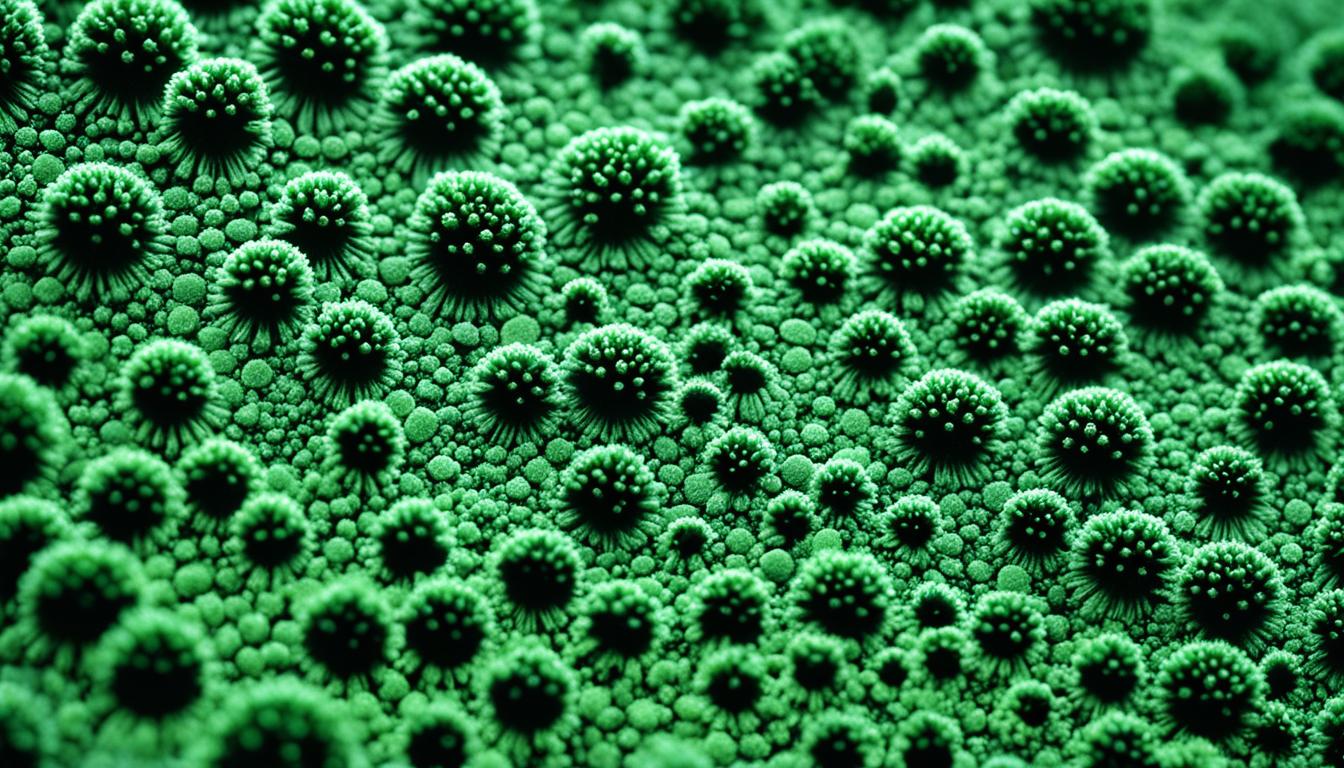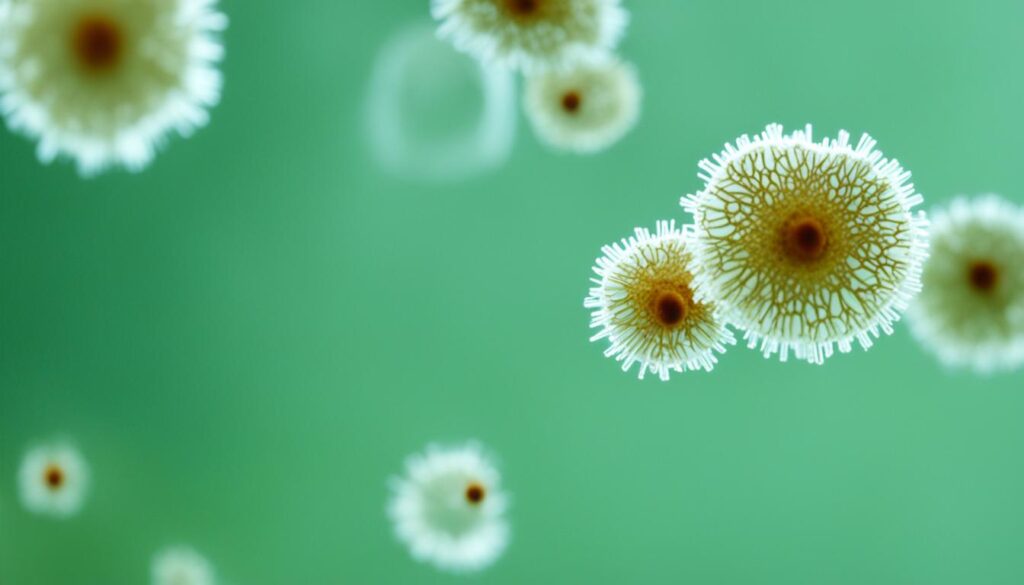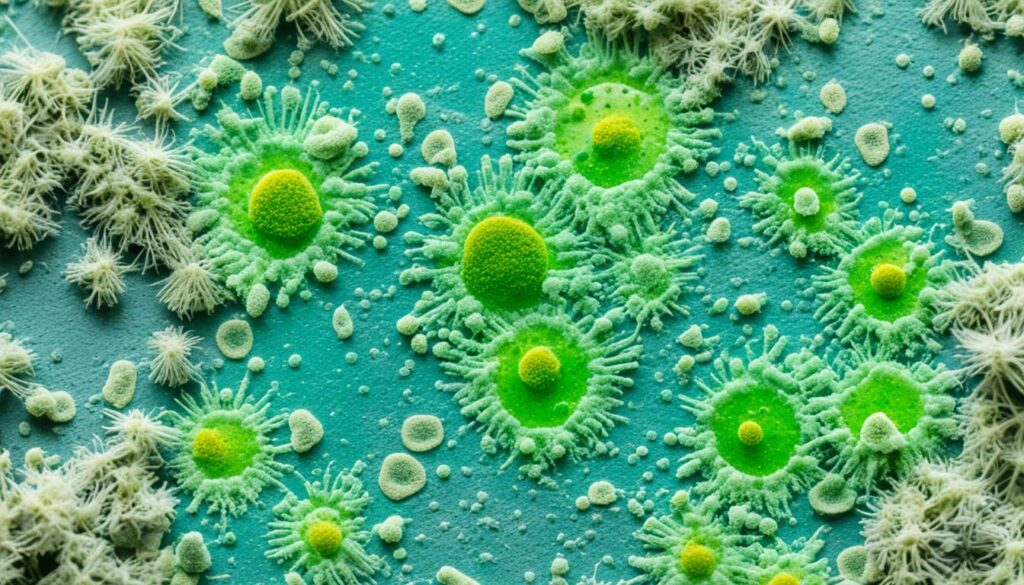
Mold Spores in House: Risks & Elimination Tips
Welcome to our informative guide on mold spores in houses. Mold spores are microscopic organisms that can pose significant risks to both your health and the structural integrity of your home. Understanding the dangers associated with mold spores is crucial for creating a safe and healthy living environment. In this article, we will explore the risks of mold spores in houses and provide you with practical tips on how to eliminate them effectively. By following these recommendations, you can ensure a mold-free home and safeguard the well-being of your loved ones.
Key Takeaways:
- Presence of mold spores in your house can lead to various health issues, including respiratory problems, allergies, and even infections.
- Mold spores can enter your home through air vents, windows, and doorways, or they can be carried indoors through clothing, shoes, or pets.
- To eliminate mold spores, it is important to control moisture levels in your house, address any water leaks promptly, and ensure proper ventilation.
- Regularly inspecting your home for signs of mold growth and promptly cleaning any affected areas can help prevent mold spores from spreading.
- If you suspect mold spores in your house, it is recommended to consult professionals who specialize in mold assessments and remediation for thorough and effective solutions.
Understanding Mold Spores
When it comes to addressing mold issues in your house, it is crucial to have a thorough understanding of mold spores. Mold spores are microscopic particles that can be found virtually everywhere, both indoors and outdoors. They are tiny, lightweight, and easily airborne, allowing them to enter your home through various entry points.
But what exactly are mold spores?
Mold spores are reproductive structures produced by molds, which are a type of fungi. These spores serve as a means of reproduction, allowing molds to spread and colonize new areas. They can be present in the air, on surfaces, and even in dust particles.
How do mold spores enter a house?
Mold spores can enter your house through open windows and doors, ventilation systems, pets, clothing, and even on the soles of your shoes. Once inside your home, they can settle on various surfaces like walls, carpets, furniture, and even in hidden areas such as attics and basements.
It is important to note that while mold spores are present in every household, their growth is triggered by the presence of moisture. Controlling moisture levels in your home is vital to preventing mold growth and protecting your health.
What are the potential health risks associated with mold spores?
Exposure to mold spores can lead to a range of health issues, particularly for individuals with respiratory conditions, allergies, or weakened immune systems. Common symptoms of mold exposure include coughing, sneezing, wheezing, nasal congestion, throat irritation, and eye irritation. Prolonged exposure to mold spores can also contribute to more severe respiratory problems and exacerbate existing health conditions.
To better illustrate the concept of mold spores and their impact, refer to the image below:

The Importance of Taking Action:
Understanding mold spores and their potential health risks is crucial for prioritizing mold prevention and remediation in your home. By being proactive in addressing mold issues and minimizing moisture sources, you can create a healthier living environment for you and your loved ones.
Assessing and Eliminating Mold Spores in Your House
To ensure a healthy and safe living environment, it is essential to assess and eliminate mold spores in your house. By taking proactive measures, you can prevent mold growth and reduce the potential health risks associated with mold exposure.
1. Mold Inspections
Start by conducting comprehensive mold inspections to identify areas of concern. Professional mold inspectors can assess your house for visible signs of mold and use specialized equipment to detect hidden mold behind walls or in damp areas. These inspections provide valuable insights into the extent of mold contamination and help guide effective remediation strategies.
2. Moisture Control
Mold thrives in moist environments, so controlling moisture levels is crucial for mold prevention. Address any water leaks, fix plumbing issues, and ensure proper drainage around your house. Install dehumidifiers in high-humidity areas like basements or bathrooms to reduce excess moisture in the air.
3. Proper Ventilation
Good ventilation helps to keep your house dry and prevent mold growth. Ensure proper ventilation in bathrooms, kitchens, and other areas prone to moisture buildup. Use exhaust fans or open windows when cooking or showering to allow moisture to escape.
4. Effective Cleaning Techniques
Cleaning contaminated areas is essential for eliminating mold spores. Use a mixture of water and detergent to clean mold-infested surfaces, ensuring you scrub thoroughly to remove all traces. For larger areas or severe mold growth, consider hiring professional mold remediation services to ensure a thorough and safe cleanup.
“By implementing these strategies, you can assess and eliminate mold spores in your house, creating a healthier living environment for you and your family.” – Expert Mold Remediation
Remember, mold removal should be taken seriously, especially if you have underlying health conditions or extensive mold growth. If in doubt, consult with professionals who specialize in mold assessment and remediation. Your efforts to address mold spores will go a long way in preventing potential health issues and maintaining a clean and mold-free home.

Conclusion
In conclusion, addressing mold spores in your house is essential for maintaining a healthy living environment. Mold spores can have detrimental effects on both your property and your health. They can cause structural damage, trigger allergies, and even lead to respiratory issues.
To effectively eliminate mold spores, it is crucial to take proactive measures. This includes conducting regular mold inspections, controlling moisture levels, ensuring proper ventilation, and implementing effective cleaning techniques.
If you are facing mold issues in your home in Florida, don’t hesitate to reach out to Fix Mold Miami at 305-465-6653. Their team of professionals specializes in mold assessments and remediation services in the area. By seeking their expertise, you can ensure that your house is mold-free and create a safer and healthier living space for you and your family.




